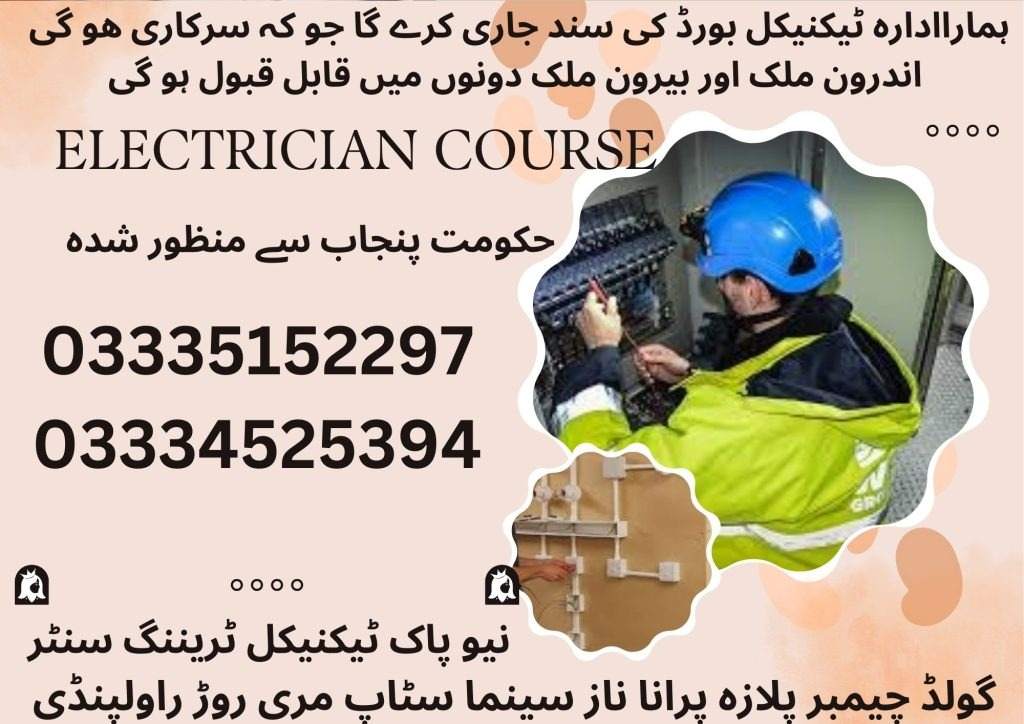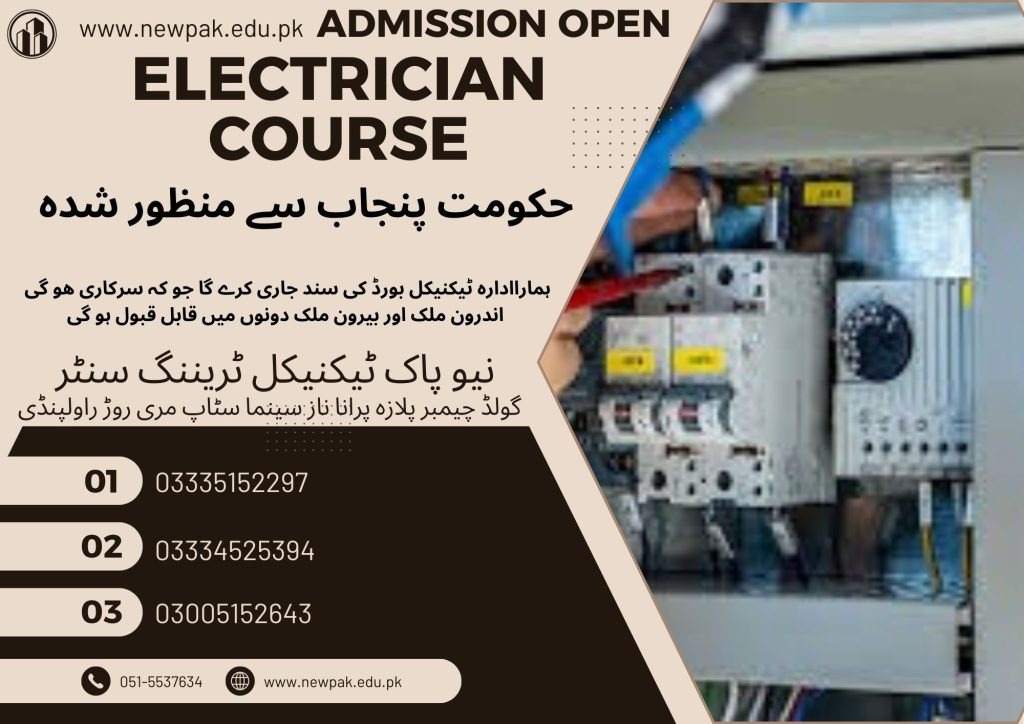
Electrician Course In Rawalpindi Islamabad
Our Electrician Course is a hands-on, industry-aligned program ideal for those seeking electrician training in residential, commercial, or industrial settings. Through practical learning and theory, this course builds a strong foundation in electrical systems, safety, and equipment. It’s well-suited for beginners or professionals looking to upgrade their skills through structured electrical technician training.
Course Overview
This Electrician Course in Islamabad covers the essentials of modern electrical training, including electrical fundamentals, safe work practices, wiring techniques, motor control, and troubleshooting. Both basic and advanced electrician training programs provide students with practical knowledge applicable to real-world scenarios. Upon completion, learners are prepared for fieldwork, certification exams, and a wide range of electrical trade roles.

Course Duration
06 | Months
- Introduction to Electrical Technician Course
- Electrical Safety & Standards
- Electrical Materials, Tools & Equipment
- Residential Wiring and Installation
- Practical Skills Development
- Estimation and Certification Preparation
- Detailed Scope of Electrical Training Courses in Pakistan
01 | Year
- Introduction to Electrical Fundamentals
- Electrical Safety & Standards
- Electrical Materials, Tools & Equipment
- Residential Wiring and Installation
- Practical Skills Development
- Estimation and Certification Preparation
- Commercial & Industrial Wiring
- Motors, Control Systems & Protection
- Advanced Electronics and Digital Systems
- Electrical Power Systems & Distribution
- Electrical Business & Project Estimation
- Advanced Troubleshooting & Certification Prep
Course Outline (6 Months)
Electrical Fundamentals
Month 1
- Role of an Electrician (Residential, Commercial, Industrial, Maintenance)
- Basic Electrical Concepts: Voltage, Current, Resistance, Power
- Ohm’s Law and Kirchhoff’s Laws
- AC vs. DC Circuits
- Series and Parallel Circuits
Electrical Safety & Standards
Month 2
- Electrical Safety Principles
- PPE Usage
- Electrical Hazards and Risk Prevention
- Emergency Procedures
- Introduction to Lockout/Tagout
- Workplace Safety Standards (OSHA, NFPA 70E basics)
Electrical Materials, Tools & Equipment
Month 3
- Conductors, Insulators, Conduits
- Switches, Breakers, Relays, Transformers
- Electrical Tools & Usage
- Electrical Equipment Operation and Maintenance
Residential Wiring and Installation
Month 4
- NEC Code Basics for Residential Wiring
- Wiring Methods: NM Cable, Conduit, Armored Cable
- Installation of Outlets, Switches, and Lighting Fixtures
- Circuit Breakers and Load Distribution
- Reading Wiring Diagrams and Schematics
Practical Skills Development
Month 5
- Hands-on Wiring Practice
- Troubleshooting Basics for Electrical Systems
- Electrical Testing Tools: Multimeter, Clamp Meter
- Repair of Common Household Electrical Equipment
Estimation & Certification
Month 6
- Load Calculations and Circuit Sizing
- Material Estimation for Residential Projects
- Cost Estimation Basics
- Introduction to Exam Preparation for Electrician Licensing (Optional)
- Final Lab Evaluations & Assessments
Course Outline (1-Year)
Months 1–6: Basic Electrician Course In Rawalpindi Islamabad
(Same course content as the 6-month program but with more detail, role-plays, software demos, and assessments.)
Commercial & Industrial Wiring
Month 7
- Commercial Electrical System Design
- Power and Lighting Distribution for Offices & Shops
- Industrial Wiring Methods and Safety Protocols
- Reading Electrical Blueprints & Layouts
- Installation of Equipment for Industrial Use
Motors, Control Systems & Protection
Month 8
- Types of Electric Motors and Working Principles
- Motor Starting Methods and Protection Devices
- Motor Control Circuits
- Introduction to Programmable Logic Controllers (PLC)
- Use of HMI (Human-Machine Interface)
Advanced Electronics and Digital Systems
Month 9
- Semiconductor Devices (Diodes, Transistors)
- Amplifiers, Logic Gates, and Timers
- Digital Circuits and Troubleshooting
- Application in Automation and Control
Power Systems & Distribution
Month 10
- Generation, Transmission, and Distribution
- Transformer Operation and Testing
- Power Factor Correction
- Power System Analysis and Fault Protection
Estimation & Business Management
Month 11
- Advanced Load Calculations and Design for Commercial Projects
- Project Planning and Scheduling
- Contract & Cost Management
- Bidding Techniques and Proposal Preparation
- Business Operations for Electrical Contractors
Troubleshooting & Certification
Month 12
- Troubleshooting Complex Electrical Systems
- Equipment Repair (Motors, Transformers, PLC Modules)
- Final Practical Projects (Residential, Commercial, Industrial Wiring Simulations)
- Mock Exams and Certification Readiness
- Career Guidance and Job Placement Support

Career Opportunities
- Residential Electrician
- Commercial Electrician
- Industrial Electrician
- Electrical Technician
- Electrical Maintenance Supervisor
- Motor Control Technician
- PLC Technician
- Transformer Technician
- Electrical Estimator
- Electrical Project Manager
- Electrical Contractor / Entrepreneur
- Electrical Blueprint Reader
Conclusion
The Electrician Course in Rawalpindi Islamabad delivers in-depth training from basic electrical theory to advanced commercial systems, making it ideal for aspiring electricians. Through a hands-on approach and alignment with safety standards, this electrical course prepares students for real-world challenges. Whether you’re starting a trade or upskilling at New Pak Technical Training Centre, the program offers practical knowledge and career advancement opportunities in the electrical industry.






